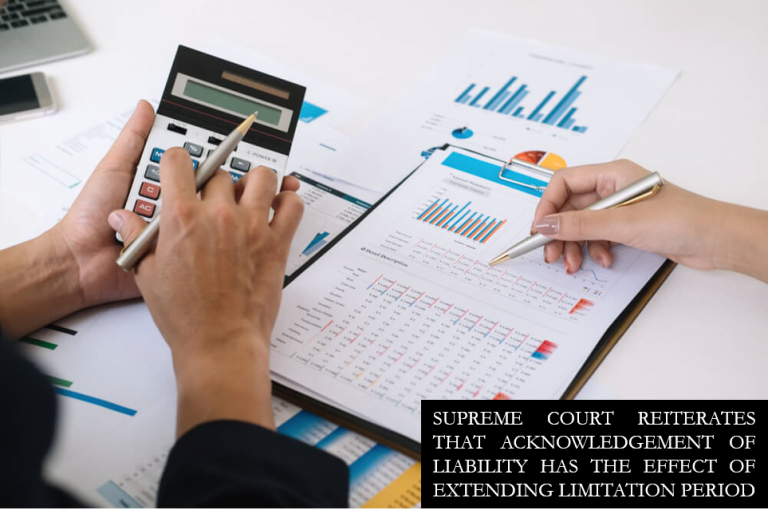SUPREME COURT REITERATES THAT ACKNOWLEDGEMENT OF LIABILITY HAS THE EFFECT OF EXTENDING LIMITATION PERIOD
The #SupremeCourt has in a recent case of <strong><em>Asset Reconstruction Company (India) Limited vs Bishal Jaiswal and Anr.</em></strong> passed a Judgment dated 15-04-2021 and reiterated that #acknowledgement of #liability/#debt has the effect of commencing a fresh period of #limitation under Section 18 of the Limitation Act 1963 and such acknowledgement must be contained in a document addressed to the creditor.
In this case, Corporate Power Limited (<strong>the Corporate Debtor</strong>) had taken loans from various lenders including the State Bank of India <strong>(SBI)</strong> for setting up of thermal power project in Jharkhand in 2009 (<strong>Project</strong>). Later, the account of the Corporate Debtor was declared as non-performing asset (<strong>NPA</strong>) by SBI in 2013. All such lenders assigned their debt to Asset Reconstruction Company (India) Limited (<strong>the Appellant</strong>) in 2015. The Appellant issued notice under Section 13 (2) of the Securitisation and Reconstruction of Financial Assets and Enforcement of Securities Interest Act, 2002 [<strong>SARFAESI Act</strong>] on behalf of the consortium of lenders, thereby requiring the Corporate Debtor to discharge its liabilities, failing which, the creditors would take legal action against it. In 2016, the Appellant took actual physical possession of the Project Assets of the Corporate Debtor under the SARFAESI Act.
Meanwhile, the Appellant also filed an Application under Section 7 of the Insolvency and Bankruptcy Code 2016 <strong>(IBC)</strong> before the National Company Law Tribunal <strong>(NCLT)</strong> Kolkata in 2018 for a default amounting to Rs. 59,97,80,02,973/- from the Corporate Debtor. The Appellant also filed various documents including balance sheets of the Corporate Debtor, where it had acknowledged its liability to pay the dues. The said balance sheets were signed before expiry of three years from the date of default. The Apex Court has in various cases held that limitation period for initiating corporate insolvency resolution process (<strong>CIRP</strong>) under IBC is three years from the date of default.
The NCLT held that entries in the balance sheet acknowledging the debt were within limitation period and thus, admitted the Section 7 Application on the ground that the Corporate Debtor has acknowledged its liability to pay the dues, vide Order dated 14-12-2018. Further, the NCLT held that such acknowledgement of liability would have the effect of commencing a fresh period of limitation under Section 18 of the Limitation Act 1963 (<strong>Limitation Act</strong>).
Aggrieved, the Corporate Debtor filed an Appeal before the National Company Law Appellate Tribunal (<strong>NCLAT</strong>) thereby referring to another NCLAT Judgment dated 12-03-2020 in another case of <strong><em>V. Padmakumar v. Stressed Assets Stabilisation Fund</em></strong>, Company Appeal (AT) (Insolvency) No. 57 of 2020, which held that entries in balance sheets do not amount to acknowledgement of debt for the purpose of extending limitation period under Section 18 of the Limitation Act. However, the NCLAT refused to adjudicate upon the said issue in this case.
Thereafter, the Appellant filed an Appeal before the Supreme Court thereby challenging the said NCLAT Judgment dated 12-03-2020 of <strong><em>V. Padmakumar </em></strong>case.
The Apex Court made the following observations in this case:
<strong>1)</strong> That Section 238A IBC provides that <em>the provisions of the Limitation Act, 1963 (36 of 1963) shall, as far as may be, apply to the proceedings or appeals before the Adjudicating Authority, the National Company Law Appellate Tribunal, the Debt Recovery Tribunal or the Debt Recovery Appellate Tribunal, as the case may be</em>. Thus, Limitation Act is applicable to IBC.
<strong>2)</strong> Therefore, Section 18 of the Limitation Act which provides that acknowledgement of liability would have the effect of commencing a fresh period of limitation, will also be applicable to CIRP proceedings under IBC.
<strong>3)</strong> Further, entries made in balance sheet amount to acknowledgement of debt on the following grounds:
<strong>i)</strong> Section 134 and 137 of the Companies Act 2013 mandate a company to prepare and file its financial statements along with the auditor’s report with the Registrar of Companies (<strong>ROC</strong>). Thus, the company is compelled by law to prepare and file balance sheets.
<strong>ii)</strong> However, there is no compulsion in law to make acknowledgements and admissions in balance sheets filed with ROC.
<strong>iii)</strong> Thus, despite having no compulsion in law, if a company has made any admission of debt/liability towards any creditor in its balance sheet, the same would be considered as acknowledgement of liability of the company.
Hence, based on the aforesaid grounds, the Supreme Court held that entries made in balance sheet amount to acknowledgement of liability and such acknowledgement would have the effect of commencing a fresh period of limitation under Section 18 of the Limitation Act.
Thus, the Apex Court set aside the NCLAT Judgment dated 12-03-2020 of <strong><em>V. Padmakumar </em></strong>case and remanded the present matter to NCLAT for deciding the limitation issue in accordance with law laid down in this case.
<strong> </strong>
<strong>Harini Daliparthy</strong>
<strong>Senior Legal Associate</strong>
<strong>The Indian Lawyer</strong>





































Leave a Reply